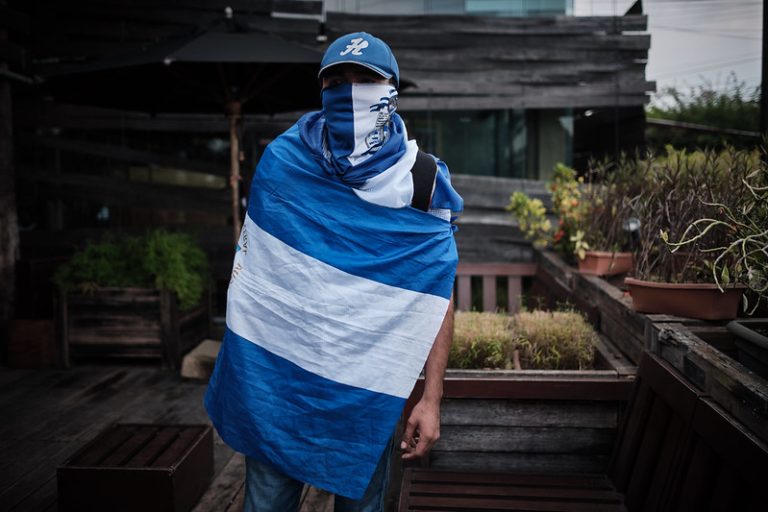30 de octubre 2019

News About Sheynnis Palacios Not Covered by Media Operating in Nicaragua

PUBLICIDAD 1M
PUBLICIDAD 4D
PUBLICIDAD 5D
If you sow segregations, you will reap more rebellions. There is no doubt that many red and black will turn blue and white

Hooded individuals surround your home. They throw burning objects with the intention that the fire expands. There is no point in calling the police because your colors disqualify you from resorting to the State. Your family appeared in Facebook showing those colors turned into a stigma.
It turns out that the police were already there, when the fire began, working in a task very different from the one that motivated you. At gunpoint they stop those who try to put out the fire and protect the hooded ones, who are not from the Ku Klux Klan, but act as if they were. Your mother, your father, your nephews, your sisters…all died burned.
There is no use in crying and complaining because you colors annul your citizenship: your vote is not counted, your opinion in the media is terrorism, your marches considered an attack on the public order. If your house burst in flames and you lost your whole family, you are not in Alabama at the beginning of the 20th century. You are in the Carlos Marx neighborhood, on one of the busiest streets of Managua of 2018.
Another day, another neighborhood. The hooded men assault a neighbor at the doors of your house. Your security cameras capture the scene. The recording is useless because your colors don’t allow you to have security cameras. Hours later the police visit you. They are looking for weapons that they can’t find, because for those of your colors it’s a crime to have them. They take the videos that in any case not a single court in the whole country would be willing to consider as incriminating evidence. It is your colors; it is always because of your colors.
You are walking down the street with your sister. You are kidnapped by hooded men. Your sister is burned with cigarettes in her abdomen, legs and chest. You are marked on the leg with the word “plomo” (lead). Both are groped, beaten and threatened with death throughout the night.
After ten hours at the foot of the gallows, they release you on the road to Leon. You don’t go to the police or the prosecutor’s office. It does not even cross your mind. You could even end up in prison and suffer more ill-treatments. What happened was due to your colors and public officials will give you treatment reserved for those colors.
Switching the television channels, you stumbled upon the government channels. Everything is peace, love and prosperity for those of the colors you do not have. In their news programs, not even the torrential rains that have flooded cities and municipalities appear.
You heard the official propaganda about the prosperity that is supposed to cover us, but that is for an increasingly tiny group. It is for those who have the right colors and doesn’t even reach all of them. It is not for you because you don’t even have the right to have rights.
They seize your weapon, but your neighbor is armed to the teeth. They cancel your march, confiscate your television channels and withdraw your lawyer’s license, while the red-and-black march blocks the main artery of Managua, the red-and-black TV channels multiply and the unprincipled lawyers of the regime get fatter—those do thrive—like vultures in a carrion feast.
Blacks in the United States and South Africa lacked rights. Their political segregation was based on color. The power resolve of whites had built arbitrarily on pigmentation an entire ideology that affirmed the moral, physical and intellectual inferiority of ethnic groups.
Stalinism was a regime of political segregation, which pursued the most insignificant signs of dissidence with relentless ferocity, exactly as now happens in Nicaragua, where a lack of political loyalty is suspect and associated with disorder, coups and terrorism.
You are not in Apartheid South Africa, but it is as if you were living there. You are not a segregated black, but it is as if you were. You are in the Christian, Socialist and Solidarity Nicaragua, and your colors are blue-and-white. Those colors are dangerous because it is that of the segregated majority. Throwing a blue-white balloon is a crime. To exhibit red-and-black objects is a patriotic duty: the red-and-black flags fly in all Nicaraguan embassies and state entities.
Not even the whitest businessmen have been free of receiving the reserved treatment of segregated blacks. Give or take the economic differences: they are shot at, their companies looted, their farms invaded, they are summoned to police stations with trite excuses, patrols pursue them until they seek shelter in one of their exclusive clubs, the hack writers of the regime spread rumors about the stability and probity of their banks to break them through financial panic.
If this happens with those in suit and ties, the ones with a machete and rubber boots are worse off. They are ambushed in the ravines and executed in front of their relatives. At the bottom of the barrel without rights are natives of the Caribbean Coast: they destroy their forests and burn their villages. The new political segregation has placed them three places beyond zero on the left. They meet at least three negatives: they are not red-and-black, they are not whites or mestizos, they do not exercise any power over the public affairs of the nation.
Political prisoners have fewer rights than ordinary prisoners. Even the collections (of goods) for them is persecuted by the police as if they were bank robberies or tire burning. They have, instead, torture and restrictions of the visits of their relatives and lawyers. All that because of their colors.
Their experience is not atypical, it is only an extreme of what the entire population experiences daily under different modalities, each in its own surroundings. Discriminatory treatment is also suffered by the population that thought they were outside of politics.
Here is a sample: I board a taxi. An evangelical song sounds in the radio. The driver interrupts our prolonged mutism and breaks the ice, stepping on insecure ground because I have not said a word that reveals my colors: “How nice if everything were like this, as the song says: “the heavens sing, the earth sings…your praise, Lord.”
But here it is not so. I don’t get into politics or want to know anything about it. But here people are already fed up. This cannot last. Did you see that I slammed on the brakes at the traffic light? I had to do it because if I go through when the first blink starts, those who are there will grab me. I have colleagues who are fined every week. But, of course: they do not touch their own. The red-and-black can pass the red traffic lights and be drunk as a skunk, and nothing happens.”
That is the Nicaragua of Ortega and Murillo, a segregated Nicaragua.
Another sample: several delinquents participate in an armed robbery. Brave neighbors capture a member of the gang, beat him up and hand him over to the police. Minutes later the police return to the scene. They look for the neighbors to accuse them for injuries to a Sandinista Front militant. In a segregated country, roles are reversed: the brave end up in prison and the criminals throw the stone and show their hand.
The regime, although it hopes for normality, in the day by day does nothing but deepen the polarization with a clearly differentiated treatment that in practice deprives most Nicaraguans of political citizenship. If you sow segregations, you will reap more rebellions.
The fact that the segregated have self-identified as blue-and-white is in itself the will to annul all segregation. And since it is desirable to change pigmentation to the one better positioned, there is no doubt that many red-and-blacks—as others have already done—will become blue-and-whites. One day Nicaragua will be all blue-and-white.
PUBLICIDAD 3M
Escribió en CONFIDENCIAL entre 2026-2021. Doctor en Sociología por la Philipps Universität de Marburg (Alemania). Se desempeñó como investigador asociado en la Universidad Centroamericana José Simeón Cañas y del Instituto Brooks para la Pobreza Mundial de la Universidad de Manchester. Fue director del Servicio Jesuita para Migrantes en Nicaragua.
PUBLICIDAD 3D